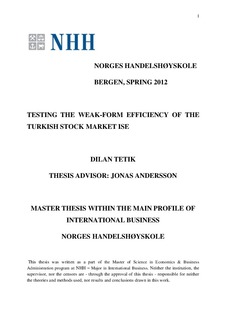Testing the weak-form efficiency of the Turkish stock market ISE
Master thesis
Permanent lenke
http://hdl.handle.net/11250/169575Utgivelsesdato
2012Metadata
Vis full innførselSamlinger
- Master Thesis [4372]
Sammendrag
This study examines the Turkish Stock Market, Istanbul Stock Exchange (ISE) to determine whether it is weak-form efficient. For this purpose, daily observations of the closing prices of ISE100 index have been tested for the period between 04.01.1988 and 11.04.2012. The data has been tested for the validity of the market efficiency hypothesis at the weak level by two empirical tests, namely test of serial correlation and Lo and MacKinlay‟s variance ratio test. The tests were applied to both the full sample period and four sub-periods in order to see if the level of (in)efficiency differs among periods and if the Turkish stock market has been moving towards efficiency. Both the serial correlation test and the variance ratio test suggest that the market is not weak-form efficient. However, the analyses on the sub-periods show that the level of inefficiency varies through time and it is lowest at the last period which is between 2009 and 2012.
